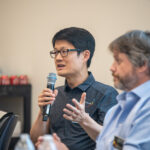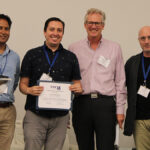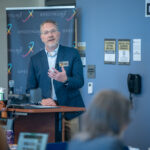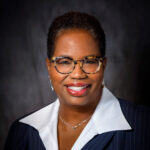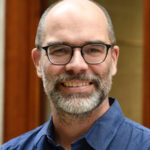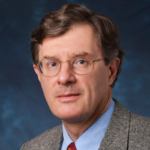Dr. Stephanie G. Adams is the 5th Dean of the Erik Jonsson School of Engineering and Computer Science at the University of Texas, Dallas. Previously Dr. Adams served as the Dean of the Frank Batten College of Engineering and Technology at Old Dominion University (2016–2019), Department Head and Professor of Engineering Education at Virginia Tech (2011–2016) and held faculty and administrative positions at Virginia Commonwealth University (2008–2011) and the University of Nebraska-Lincoln (1998–2008).
Her research interests include: Broadening Participation, Faculty and Graduate Student Development, International/Global Education, Teamwork and Team Effectiveness, and Quality Control and Management. In 2003, she received the CAREER award from the Engineering Education and Centers Division of the National Science Foundation. Dr. Adams is a leader in the advancement and inclusion of all in science, technology, engineering, and mathematics (STEM) education. She has worked with a number of colleges and universities, government agencies and non-profit organizations on topics related to graduate education, mentoring, faculty development and diversifying STEM. A few examples include: The University of Michigan, North Carolina State University, NASA Must Program, QEM Network and the Gates Millennium Scholars Program.
Dr. Adams is a leader in the advancement and inclusion of all in science, technology, engineering, and mathematics (STEM) education. She has had the privilege of serving on the Board of Directors for a number of STEM organizations including the American Society of Engineering Education, the National Society of Black Engineers, Women in Engineering ProActive Network, and the National GEM Consortium. She has also worked with the National Academy of Engineering, the Society of Hispanic Professional Engineers, the Institute of Electrical and Electronics Engineers, Institute of Industrial Engineers, the Quality Education for Minorities Network, and the Council of Graduate Schools to build supportive educational coalitions and partnerships in advancing the engineering profession and educational community.
Dr. Adams is the recipient of numerous awards, including: the 2017 WEPAN Founder’s Award; the 2016 ASEE Engineering Management Division Bernard R. Sarchet Award; the 2013 North Carolina A&T State University Distinguished Alumni Award; the 2008 DuPont Minorities in Engineering Award from the American Society of Engineering Education; the Holling Teaching/Advising/Mentoring Award, the Henry Y. Kleinkauf Outstanding Assistant Professor Teaching Award, the Assistant Professor Service Award and the Chancellor’s Fulfilling the Dream Award from the University of Nebraska-Lincoln; and the Janice A. Lumpkin Educator of the Year from the National Society of Black Engineers. In 2005, she was selected as an AAAS/NSF Science and Engineering Policy Fellow and in 2006 she was an Invited Participant for the U.S. Frontiers in Engineering Symposium hosted by the National Academy of Engineering.
Dr. Adams is an honor graduate of North Carolina A&T State University, where she earned her BS in Mechanical Engineering, in 1988. In 1991, she was awarded the Master of Engineering degree in Systems Engineering from the University of Virginia. She received her Ph.D. in Interdisciplinary Engineering from Texas A&M University in 1998, where she concentrated on Industrial Engineering and Management. She holds membership in a number of organizations and serves as Past President and a Fellow of the American Society of Engineering Education, is a member of the National Advisory Board of the National Society of Black Engineers and is a Diamond Life of member of Delta Sigma Theta Sorority, Incorporated.
